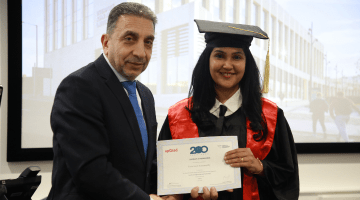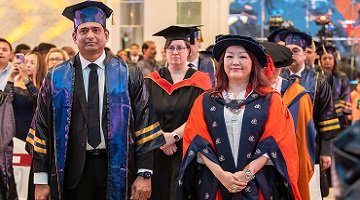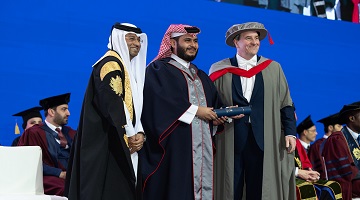About this course
Excellent research opportunities await in the Dept. of Computer Science, enabling you to work at the forefront of developments with leading experts.
- Study full or part-time over two to seven years
- Complete your research degree (MPhil/PhD) in a Faculty known for its internationally-acclaimed research
- Explore scholarship opportunities
- Benefit from expert supervision and researcher training
- Enjoy excellent facilities and great employment connections
The programme route you undertake will depend on your qualifications and experience.
On joining LJMU you will be allocated up to three supervisors (including a Lead Supervisor) who will work with you during your studies. Progression monitoring is undertaken formally and informally by this team on an ongoing basis.
Each year, each Faculty provides the University Research Degrees Committee with a summative report on the progress of all its eligible postgraduate research students.
Throughout your studies, you will also have the support of LJMU’s Doctoral Academy which offers expert advice and guidance to those enrolled on MPhil and PhD programmes.
Course modules
Discover the building blocks of your programme
The Department of Computer Science offers a vibrant teaching and research environment, equipped with the latest facilities.
It has a supportive community of over 1000 taught students and more than 70 researchers from at least 20 countries worldwide as well as over 40 highly qualified academics plus teams of skilled technical and administrative staff.
In addition to University-wide IT facilities, you will have access to up-to-date specialist computing facilities within the Department itself. We have nine specialist teaching laboratories, with over 400 workstations, managed by a team of eight technical staff.
We offer a range of desktop platforms from Windows to MacOS and Linux as well as mobile platforms, such as iOS and Android. We also offer a cloud environment and virtualisation systems for specialist applications.
We are a licensed Sony PlayStation developer and have PS4 and Vita development kits. Our research laboratories are fitted with air conditioning, ergonomic seating and category 2 lighting, plus state-of-the-art design technology for a modern computing environment.
The Department has a rich research base and, in the latest research assessment (REF 2014), 48% of our research was ranked as being internationally excellent, with 80% of our research rated as high impact in terms of reach and significance.
We are proud of our growing research reputation and have a long-standing history of working with local, regional and national industries through student placements, research, consultancy, short course activity and Knowledge Transfer Partnerships. We have a number of collaborative partnerships both locally and internationally.
Further guidance on modules
Modules are designated core or optional in accordance with professional body requirements, as applicable, and LJMU’s Academic Framework Regulations. Whilst you are required to study core modules, optional modules provide you with an element of choice. Their availability may vary and will be subject to meeting minimum student numbers.
Where changes to modules are necessary these will be communicated as appropriate.
Your Learning Experience
An insight into teaching on your course
To complement your research, specific training needs will be identified on an individual basis. You can study topics such as:
- Advanced Presentation Skills
- Applying for Ethical Approval
- How to be an Effective Researcher
- Poster Presentation/Design
- Postgraduate Employability Skills
- Project Management
- Writing Skills including Creative Planning for Writing your Thesis
- Surviving the Viva
- Speed Reading
How learning is monitored on your programme
Final examination for both the MPhil and the PhD is by thesis and oral examination.
The MPhil differs from the PhD in terms of the depth of study required and the extent of your personal contribution to knowledge. It requires competence in conducting an independent enquiry as well as in the use of appropriate research methods and techniques. Examiners will expect you to display satisfactory background knowledge of the subject.
To gain a PhD you are expected to show mastery of a special field and to have made an original personal contribution to the understanding of a problem, the advancement of knowledge, or the generation of new ideas. Examiners will expect you to be at the forefront of understanding in your chosen topic.
Where you will study
We offer postgraduate researchers access to excellent teaching and learning facilities plus plentiful social spaces and, of course, support and guidance from our expert academics.
Career paths
Further your career prospects
LJMU has an excellent employability record with 96% (HESA 2018) of our postgraduates in work or further study six months after graduation. Our applied learning techniques and strong industry connections ensure our students are fully prepared for the workplace on graduation and understand how to apply their knowledge in a real world context.
Studying for a postgraduate research degree enhances your employability in a number of ways.
As well as enabling you to focus on your specific areas of interest and expand your subject knowledge ready for employment in your chosen sector, a postgraduate research qualification enables you to take charge of your career path by demonstrating your contribution to an area of knowledge. It enhances your self-confidence and showcases your ability to work independently and ‘go it alone’.
Some postgraduate research students are already in full-time employment when they begin their studies, whilst others are recent graduates looking to extend their research capabilities and subject expertise.
A good proportion of our students return to their existing roles with enhanced career prospects, others move on to further study or take up teaching roles in educational establishments.
According to a report by the Higher Education Statistics Agency (HESA), more than a quarter of graduates felt that their employment prospects were increased by their PG qualification. And when it comes to earnings, those with a postgrad qualification have been shown to earn an average of 24% more than those who leave education with an undergraduate degree.
Tuition fees and funding
How to fund your postgraduate research
Securing funding can be one of the main hurdles you face when considering postgraduate research. However, help is available. LJMU has a team of fees and funding experts who can offer advice based on your personal circumstances. You can contact them on 0151 231 3153/3154 or via studentadvice@ljmu.ac.uk
Entry requirements
You will need:
- For entry to MPhil - a 2:1 Honours degree in a relevant subject.
- For entry to PhD - a 2:1 Honours degree in a relevant subject, preferably also a Masters degree in a relevant subject.
Additional information:
- IELTS 6.5 minimum 5.5 in each component)
- 58-64 (minimum 51 in each component for UKVI purposes)
- RPL is accepted on this programme
We also welcome applications from those with non-standard qualifications who can demonstrate knowledge, experience, and skills developed in the workplace or other setting relevant to the programme of research.
If you do not hold the standard academic entry requirements, please use your personal statement to provide further details. Non-standard applications will be considered by the Admissions Tutor(s) on a case-by-case basis.
If you have any specific queries, please contact FETPGRAdmissions@ljmu.ac.uk.ac.uk
How to apply
Securing your place at LJMU
All research degree registrations are subject to approval by the Faculty and University’s Research Degrees Committee. The Applications process is as follows:
- Complete and submit your application using this online form (opens in a new tab)
- You will receive an acknowledgement
- Your application will be considered by the Admissions Tutor
- We will take up your academic references
- You may need to provide further information or attend an interview
- You will be informed if your application has been successful and will find out about any conditions of acceptance
Your university life
From accommodation and academic support to clubs and societies. Find out what LJMU has to offer.
Related Links
Talk to our students
Connect with a current LJMU student for advice and guidance on university life, courses and more.
See what our students are saying
At LJMU we want you to know you’re making the right choice by studying with us. You can see what our students are saying about their experience with us through their reviews on the following websites:
Related Links
News and views
Browse through the latest news and stories from the university
The University reserves the right to withdraw or make alterations to a course and facilities if necessary; this may be because such changes are deemed to be beneficial to students, are minor in nature and unlikely to impact negatively upon students or become necessary due to circumstances beyond the control of the University. Where this does happen, the University operates a policy of consultation, advice and support to all enrolled students affected by the proposed change to their course or module.


























